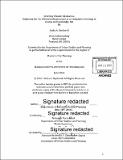Greening climate adaptation : exploring the use of green infrastructure as an adaptation strategy in Boston and Cambridge, MA
Author(s)
Shyduroff, Sasha A
DownloadFull printable version (5.998Mb)
Alternative title
Exploring the use of green infrastructure as an adaptation strategy in Boston and Cambridge, MA
Other Contributors
Massachusetts Institute of Technology. Department of Urban Studies and Planning.
Advisor
Terry Szold.
Terms of use
Metadata
Show full item recordAbstract
Interest in green infrastructure as a potential strategy for addressing climate change has recently emerged in adaptation planning. Green infrastructure (GI), defined here as engineered systems that incorporate green space and natural systems to provide benefits to the public, can be used to address impacts such as sea level rise, storm surge, inland flooding, and urban heat island effect. GI can often be implemented at lower-cost and faster timelines than grey infrastructure. It also provides a myriad of aesthetic and public health benefits, and can be an attractive "no-regrets" adaptation solution for policymakers. Despite these benefits there is a lag in scaling up green infrastructure and formally connecting it to climate adaptation policy. The planning efforts of Boston and Cambridge, MA are used as case studies to explore the barriers and drivers of employing GI as a strategy to address increased urban flooding due to climate change. An historical ecological approach sets the foundation for the analysis of current and future challenges with stormwater management. This thesis uses a review of public planning documents and semi-structured interviews to explore how socio-political factors drive or prevent the use of GI. I found that path dependencies, navigating trade-offs in decision making, and shifting risk analysis act as barriers to using GI for adaptation. I also found that adaptive learning, knowledge networks, and collaboration might be used as strategies to overcome these and other barriers.
Description
Thesis: M.C.P., Massachusetts Institute of Technology, Department of Urban Studies and Planning, 2016. Cataloged from PDF version of thesis. Includes bibliographical references (pages 71-73).
Date issued
2016Department
Massachusetts Institute of Technology. Department of Urban Studies and PlanningPublisher
Massachusetts Institute of Technology
Keywords
Urban Studies and Planning.